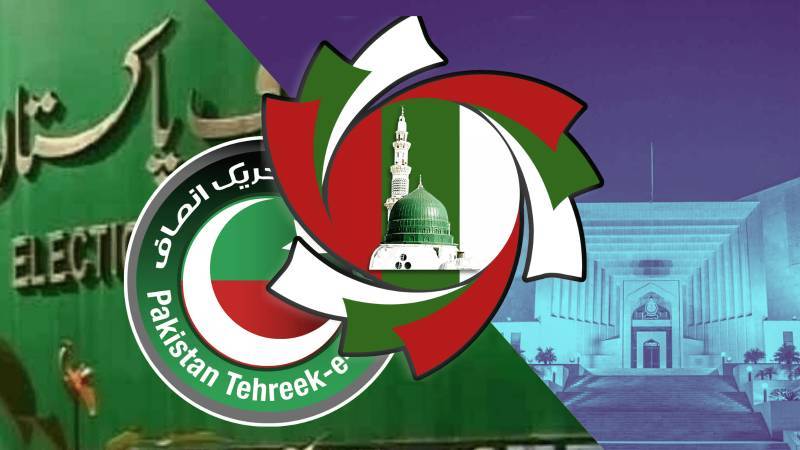
The Pakistan Tehreek-e-Insaf (PTI) has approached the Supreme Court, requesting the latter to allow the former to become a party in the reserved seats case.
The case was brought by the Sunni Ittehad Council (SIC), which PTI-backed independent candidates joined after the PTI was barred from competing in the elections as a party.
A full-court bench, headed by Chief Justice Qazi Faez Isa, is expected to resume hearings in the case on June 27.
In its application, the PTI has argued that the language of Article 51(6) (d) and (e) does not impose an absolute requirement that successful (returned) independent candidates must join a political party with at least one general seat in a house for such returned candidates to be counted for the election on reserved seats.
"The Constitution or Section 104 of the Election Act, 2017, do not require that lists for reserved seats be necessarily filed before the date of the general election," it added.
The application further contended that 86 PTI-backed returned candidates in the National Assembly, 107 in the Punjab Assembly, 91 in the Khyber Pakhtunkhwa Assembly, and nine in the Sindh Assembly were entitled to be counted for the purpose of election to the reserved seats on the basis of proportional representation.
"The denial by the ECP of reserved seats to the SIC will result in the NA and the provincial assemblies losing their representative character. These seats cannot be allowed [to be allotted] to any other party," it said.
The PTI further claimed that The SIC is committed to providing lists of candidates for the reserved seats who have a long history of involvement with the PTI and engagement with voters of the PTI.
"Grant of reserved seats to which the SIC/PTI are entitled to other political parties would be unconstitutional as well as unjust and unfair," it argued.
"No political party can be allowed reserved seats in excess of the proportion of general seats held by it in a house," it contended, adding, "It may kindly be noted that the PTI had filed lists of candidates for the seats reserved for women and non-Muslims in the National Assembly as well as the provincial assemblies on or before the last date for the filing of such lists by the ECP before the general election of February 8, 2024."
The PTI contended that many of the candidates on these lists had filed their nomination papers, declaring their affiliation with the PTI, and that denying of reserved seats to the SIC/PTI and/or the grant of a disproportionate number of seats to other political parties would deepen the denial of the will of the people that is underway through alleged oppression and election fraud to which the PTI and its supporters and candidates have been subjected to.
"The danger of far-reaching amendments to the constitutional and legal structure of the state through an unrepresentative parliament must be met with upholding the cardinal principles of democracy and representativeness of parliament," it said.
AGP says reserved seats can only be allotted to parliamentary parties
Meanwhile, the Attorney General for Pakistan Mansoor Usman Awan has submitted his reply before the top court in the reserved seats case.
The reply stated that the reserved seats for women and non-Muslims cannot be allocated except to political parties which contest general elections, have at least one returned candidate, and have furnished a separate list of candidates with the ECP.
The reply stated that the provisions of the Constitution should be interpreted in a manner where none of them is rendered redundant, superfluous or unworkable.
"The Constitution demands that its provisions are read in harmony," AGP submitted.
"In this backdrop, Articles 51(6)(d) (e) and 106(3)(c) ought to be looked at alongside Article 63A."
He further submitted that an independent returned candidate who duly joins a political party, in terms of provisos to Articles (51)(6)(d)(e) and 106(3)(c), effectively becomes a member of such political party.
"As a consequence, such member ought to be a member of the Parliamentary Party of such political party."
The AGP further submitted that on account of becoming a member of such a political party, the independent returned candidate, after administering the oath and becoming a member of a House, must necessarily become a member of the Parliamentary Party of such a political party.
"On the other hand, Article 63A(2) mandates that an independent member can only become a member of a Parliamentary Party of such political party whose, at least one, candidate or nominee won in the elections prior to such joining and constitutes a Parliamentary Party in a House."
However, the government's chief lawyer argued that no candidate or nominee of the Sunni Ittehad Council, not even its chairman, had been elected to any House.
"Therefore, Sunni Ittehad Council did not have a Parliamentary Party in any House after the general elections."

